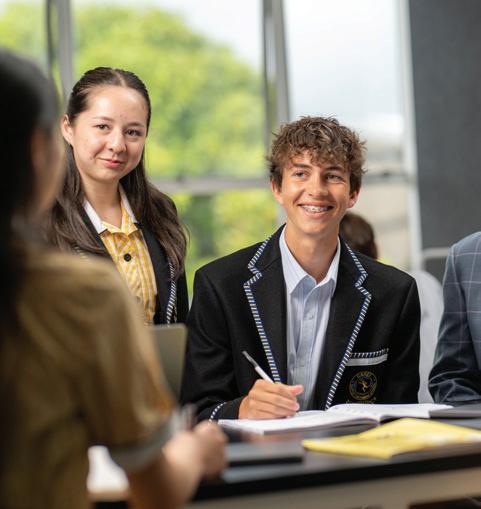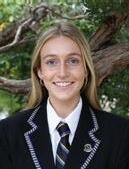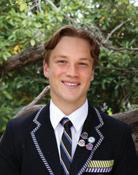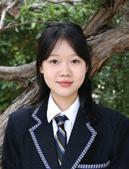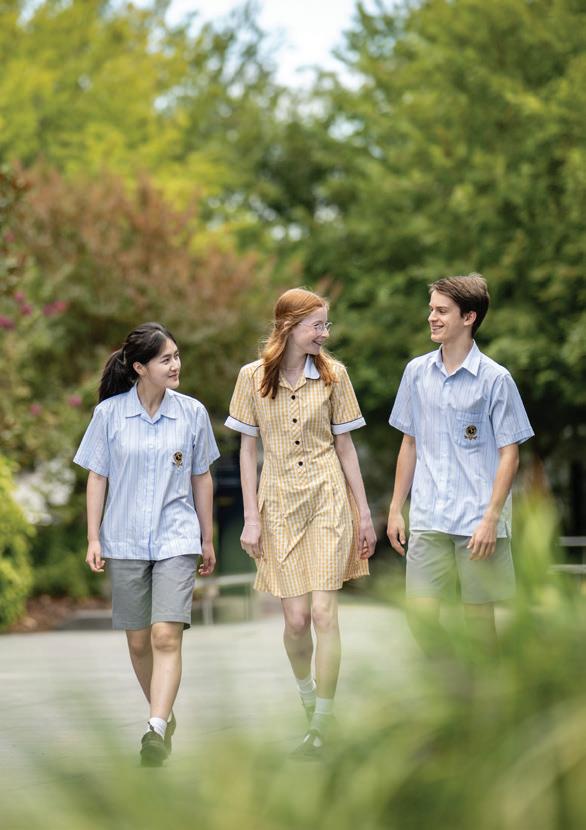What is the VCE?
The Victorian Certificate of Education (VCE) is the final high school certificate that most students in Victoria receive when they complete their secondary education. The VCE opens a wide range of pathways to further study and to employment, both in Australia and internationally.
The VCE is administered by the Victorian Curriculum and Assessment Authority (VCAA), which is responsible for curriculum, assessment and reports.
The VCE at Carey is very broad with well over 30 studies, or subjects, available to choose from in Year 11 and close to 40 different studies in Year 12. We also support students’ Vocational Education and Training and University Extension subjects – at Carey students are offered a whole range of ways to find an interesting, challenging and rewarding pathway through their VCE studies.
We also offer students the option to complete their VCE program over three years, although the major component of the VCE is undertaken when students are in Years 11 and 12.
This booklet is for all prospective VCE students, and their families, who are unfamiliar with what the VCE has to offer. It explains some of the main aspects of the VCE and suggests where you can find out more detailed or specific information.
Some common terms used in the VCE
ATAR (Australian Tertiary Admissions Rank)
The ATAR is a student’s overall ranking on a scale of 0 to 99.95, in intervals of 0.05, that compares a student to all other students who completed VCE in the same year. In many cases, the ATAR is the primary mechanism that tertiary institutions use to select students for courses.
The ATAR is calculated by ranking students according to:
• their best Study Score in one of either English, English Language, Literature or English as an Additional Language (EAL)
• the scores of their next best three studies
• 10 per cent of the scores for any fifth and sixth study.
Students can also gain extra credit for completing a University Extension subject.
GAT (General Achievement Test)
The GAT is a compulsory test that is completed by all students undertaking a:
• VCE Unit 3 and 4 sequence
• VCE VET Unit 3 and 4 sequence
• VCE Unit 3 and 4 non-scored sequence
• Any Year 12 IB student
The GAT is used by the VCAA to check that schools are marking to the same standards and as part of the statistical moderation of SACs. The GAT is also considered when calculating Derived Examination Scores and to determine whether examination papers should be remarked.
Learning Outcomes
Learning Outcomes describe the knowledge and skills students should have by the time they have completed a unit.
SAC (School Assessed Coursework)
SACs are tasks set by teachers, and marked within VCAA guidelines, to assess students’ achievement of Unit 3 and 4 outcomes. Most tasks are done in class time. The scores relating to these assessments are reported to the VCAA. Students receive feedback and a grade (A+ to E), but these are conditional as the VCAA moderates students’ total scores for all coursework, not the scores for individual tasks.
SAT (School Assessed Task)
SATs are Unit 3 and 4 school-based assessments that are part of Graded Assessment in Art, Design and Technology, Media, Studio Arts and Visual Communication and Design. SATs are extended pieces of work undertaken in and out of class. They are set by the VCAA and assessed by teachers using VCAA criteria. Task grades are subject to review by a panel appointed by VCAA.
Study Scores
Unit 3 and 4 VCE Study Scores show how students performed in a subject, or study, relative to all other students doing that same subject.
The maximum Study Score is 50. Each year, and for every study, the state-wide average Study Score is set at 30. A score of between 23 and 37 means that a student is in the middle range; a score of 38 or more indicates that a student is in the top 15 per cent of students; and a score over 45 is given to the top 2 per cent of students in the state.
To gain a Victorian Certificate of Education, a student must receive a satisfactory grade in at least 16 units. All VCE studies have at least three graded assessments for each Unit 3 and 4 sequence. Each study also includes at least one examination, most have SACs and some have SATs.
Study Score Scaling
Study Scores are adjusted or ‘scaled’ to consider the different levels of competition in different studies. Scaled Study Scores are used to calculate an ATAR.
Units
There are usually four units in a study, numbered 1, 2, 3 and 4. Each unit is the equivalent of a semester of study.
VCAA
The Victorian Curriculum and Assessment Authority (VCAA) is an independent statutory body, responsible to the Victorian Minister for Education, that oversees government and non-government schools in Victoria.
VTAC
The Victorian Tertiary Admission Centre (VTAC) administers the application processes for tertiary courses, scholarships and special entry access schemes at university, TAFE and independent tertiary colleges in Victoria. VTAC receives and forwards application information and supporting documentation to the relevant authorities at institutions; they do not decide who receives offers for courses.
Is the VCE right for me?
It’s important to weigh up your options, including thinking about the subjects you like and are good at, when considering what to study in Year 11 and 12.
One of the benefits of studying the VCE is that it offers you a lot of flexibility in choosing your subjects. Apart from having to successfully complete a number of English-group units, there are no ‘compulsory’ subjects.
For example you could choose to study all maths-science subjects and English Language or all arts-humanities subjects and Literature. You can choose to study a subject as a Unit 1 or 2 study, but not continue that subject for Unit 3 and 4. You can also choose to study some subjects as a Unit 3 and 4 study without having studied that subject at Unit 1 and 2 level. There are a lot of options to build your course over the two or three years to suit you.
Another thing to keep in mind is that if you begin the VCE, you cannot transfer to
the International Baccalaureate Diploma (IB). If you start Year 11 in the IB program, however, you can still swap to the VCE as late as the end of Year 11.
What VCE units can I study at Carey?
VCE provides the opportunity for each student to specialise in their areas of interest. With an incredibly broad subject offering, students can pursue their passions and design their own curriculum.
Carey offers numerous subjects in the fields of Art and Design, Business Studies, Religious Education, Computing, English, Humanities, Languages, Mathematics, Performing Arts, Physical Education and Health, and Science.
All students must complete at least one English subject. Carey offers English, English as an Additional Language (EAL), English Language and English Literature. More information about subject requirements can be found on page 6.
More information on specific subject availability can be found on Carey Pathways. Visit pathways.carey.com.au
What is expected of a VCE student at Carey?
There are a few key expectations that we have of our students at Carey. Whether you choose to study for the VCE or IB in Year 11 and 12, we expect all of our students to aim for their personal best in everything they do.
We ask all of our students to follow some simple guidelines:
• Maintain a positive attitude and always be respectful of your teachers and other students.
• Always apply yourself, including preparing thoroughly for and attending all of your classes.
• Maintain a work-life balance: exercise, relax and spend time with your friends and family having fun.
• Complete all of your assessments on time.
• Prepare thoroughly for all of your assessment tasks.
• Only submit work that is your own.
• Do not discuss the content of a SAC or other test with a student who has not sat the SAC yet, or with students who have sat a test or SAC before you.
• Remember that you need to apply for permission to reschedule an assessment. To do this you must have an important and legitimate reason for missing the scheduled date – approval is not automatic.
• If you are ill on the day of an assessment, notify the VCE Co -ordinator immediately. You must also obtain a medical certificate or see the School Nurse
(before the SAC/SAT).
• Seek help as soon as you sense it may be needed; your teachers, your Mentor and your Head of House are all there to support you.
How many subjects will I study each year?
There are many ways to put together a VCE program. At Carey, students generally complete the program over two years but some choose to extend it, for a variety of reasons, over three years.
The minimum requirement to gain the award of the VCE is that you satisfactorily complete at least 16 units including:
• at least three units of English/EAL/English Language/Literature
• at least three sequences of Units 3 and 4 of studies other than an English/ EAL. (It is very important to note that to receive an ATAR, you must have satisfactorily completed both Units 3 and 4 of an English study.)
Students will normally undertake Units 1 and 2 in Year 11 and Units 3 and 4 in Year 12.
At Year 11, this will include:
• two units of one of English, EAL, English Language or Literature
• 10 other units (which might include a VET sequence).
In Year 12, this will include:
• Units 3 and 4 of one of English, EAL, English Language or Literature
• four other sequences of Units 3 and 4 studies.
Can I accelerate a subject?
Most students normally undertake Units 1 and 2 in Year 11 and Units 3 and 4 in Year 12; however, the Carey timetable allows students to accelerate in some cases, if they meet certain academic and study requirements.
Year 10 students can study one sequence of Units 1 and 2 and Year 11 students can undertake one sequence of Units 3 and 4, so by the end of Year 12 Carey students may have undertaken six Unit 3 and 4 sequences, and/or a Higher Education Studies (HES) Program (the maximum permitted in the calculation of an ATAR score).
There are a few potential advantages in accelerating a subject:
• providing a path of academic extension and challenge
• qualifying for a Higher Education Studies Program in Year 1
• balancing your Unit 3 and 4 workload over two years.
If you wish to accelerate a VCE subject you will be required to put in an application. These are usually due in August, around the start of Semester 2.
Decisions about students’ applications to accelerate are based on whether they have performed at a consistently high level, in all subjects. NAPLAN, Edutest and other results may also be considered to gauge a student’s performance and potential. As a guide, you would need to achieve results that place you in the top 20 per cent of students in each measure.
While it is possible to accelerate study in the VCE there are a number of reasons why it is not in the best interest of everyone to do so. Most students do not choose to accelerate a subject in either Year 10 or Year 11.
If you think you might like to accelerate a subject, it’s important to talk through the benefits and drawbacks carefully with your teachers. If you find your accelerated subject difficult or spend too much time on that one subject, it can take important time away from your other subjects. In fact, with Unit 3 and 4 subjects, if you prepare well in Year 11 you have the potential to gain a few extra marks in every Year 12 subject, rather than just trying to score a few extra marks from just the one accelerated subject in Year 11.
Can I study a subject that is not offered at Carey?
If you wish to study a unit that Carey does not offer, you may do so with the school’s prior approval, but only if appropriate arrangements can be made.
Extra units are usually undertaken outside Carey at a language school or private provider such as the Victorian School of Languages. This kind of ‘off campus’ study comes with its own unique challenges, so before we can approve study of units outside Carey, we need to make sure that the arrangements will meet all of the VCAA requirements and that it is the best option for you considering your overall program.
If you undertake study outside Carey, it is also important to inform the Senior School Curriculum Office so that you receive full and appropriate credit.
What vocational or VET subjects can I study?
Vocational Education and Training (VET) offers nationally recognised certificate courses that are integrated into the VCE.
Carey is part of the Inner Melbourne VET cluster. There are a huge range of VET courses offered through the cluster in the creative arts, hospitality, fashion design, sport and recreation or information technology. Programs are run at a variety of locations in Melbourne’s inner east.
More information on the VET program is available from the VET Co-ordinator.
Can I study a Higher Education Subject?
Higher Education studies are an attractive option for some students because they are usually delivered after school one afternoon a week, may give students credit toward a university degree and can contribute up to 5.5 points toward their aggregate when calculating an ATAR.
VCE students can qualify for HES in some subjects if, while in Year 11, they achieve a Study Score of around 41 in a relevant VCE Unit 3 and 4 sequence or achieve excellent results in all of their Unit 1 and 2 subjects.
A range of universities in Melbourne offer HES including Monash University, the University of Melbourne, Deakin University, La Trobe University and RMIT. Subjects cover a whole range of academic disciplines including accounting, history, geography, chemistry, mathematics, legal studies, philosophy, psychology and a wide variety of languages.
Each course is taught either by university staff or secondary school teachers who have been approved by the university to teach that subject.
More information on the HES is available at: www.vcaa.vic.edu.au/curriculum/vce/ pages/higheredstudiesvce.aspx
Can I repeat a subject?
There are no restrictions on students repeating units in the VCE, but credit can be obtained only once for each unit. If you were to receive an N (unsatisfactory completion) for a unit and then repeated it and received an S (satisfactory completion), the result of the second attempt is the one counted in your VCE.
It is important to keep in mind that if you repeat a unit, you must repeat the whole unit, including all of the assessment tasks and coursework.
Although there is no penalty applied to the scaled score of any repeat attempt of a Unit 3 or 4 sequence, some tertiary courses may re-rank students who have repeated a unit.
Is it possible to change my subjects?
If you find that a VCE subject is not right for you, it is sometimes possible to drop the subject or transfer into another subject, especially if it is early in the semester. It is important to keep in mind the number of units you need to satisfactorily complete in order to receive your VCE qualification.
To be awarded your VCE certificate, you have to complete at least 16 units successfully, with at least three units of an English subject (English, Literature, English Language or English as an Additional Language) and at least three sequences of Units 3 and 4 studies other than an English subject, so there are some units that you may not be able to change.
Whether or not you change a subject depends on a few other factors too. For example, the subject you want to pick up may be timetabled at the same time as one of your other subjects or the class may already be full.
Carey has a process in place to make sure that changing subjects is the right decision for you. We will also require you to talk the issue through with your class teacher, your Mentor, the relevant Head of Department and the relevant curriculum Co-ordinator.
Who can study English as an Additional Language (EAL)?
English as an Additional Language (EAL) is an English study designed for students who come from a background where English is not their first language. Students who wish to study EAL in Units 3 and 4 are required to apply for official EAL status.
You are eligible for EAL status if you meet all of the following VCAA requirements at the time of commencing your Unit 3–4 study:
• You have been a resident in Australia or New Zealand or other predominantly English-speaking country for no more than seven years. The period of seven years is calculated cumulatively over your whole life.
• English has been your major language of instruction for a total period of no more than seven years over the period of your education.
If you think you might be eligible for EAL status, Carey will help you with your application. More information about EAL status and the EAL course at Carey is available at: pathways.carey.com.au
What special consideration is available?
Students whose performance is adversely affected to a significant degree, by illness, any factors relating to personal environment or other serious cause, or disadvantaged by a disability or impairment including learning difficulties, may apply for Special Provision to maximise their opportunity to demonstrate both what they know and what they can do.
Applications for special provisions need to be made through Carey’s Year Level Co-ordinator, but keep in mind that special provisions are only available in very specific situations.
Students who have EAL (English as an Additional Language) status are not eligible for special examination arrangements on this basis alone.
The Special Entry Access Scheme (SEAS) is run by most institutions to which you will be applying through VTAC. SEAS is for students who have experienced educational disadvantage and it is broken down into six categories: personal information and location; non-English speaking background; difficult circumstances; disadvantaged financial background; disability or medical condition; and the La Trobe University SALT program (Schools Access La Trobe), Federation University Australia REEP, (Regional Entry Education Program) and Victoria University’s PPP (Portfolio Partnership Program).
How is the VCE regarded interstate and overseas?
If you are interested in studying interstate or overseas, the VCE is very well regarded around Australia and at international universities.
When you complete the VCE you receive an ATAR, which provides a clear comparison of your academic performance in relation to other students throughout Australia. This makes considering VCE graduates very straightforward for interstate universities.
The VCE is also well regarded by major universities around the world. Many even give a strong indication of the ATAR range they consider for applicants on the international undergraduate admissions pages of their websites. For some universities, you may also be required to complete some other standardised tests such as the SAT or ACT College readiness test for the United States.
You can find more information about a university’s international admissions procedures from their individual websites.
Can I get credit for overseas high school study?
If you have studied senior high school courses or subjects interstate or overseas, you may be able to get VCE unit credits for your study.
For example it is quite common for students to gain VCE credit for having completed GCSE subjects, HKCE (Form 5), HKALC (Form 6), Sijil Pelajaran Malaysia (Form 5), Sijil Tinggi Persekolahan Malaysia (Form 6), High School Senior Grade 2 (Year 11) and High School Senior Grade 3 subjects in China.
More information about receiving credit for international study in the VCE can be found at: https://www.vcaa.vic.edu.au/assessment/results/credit-recognition/ credit-vce/Pages/Index.aspx
